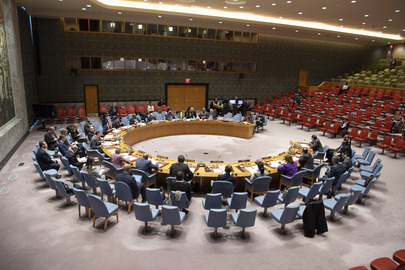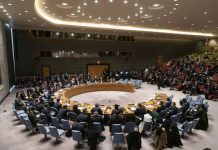Transforming agrifood systems focus of World Food Day
Governments, farmers, communities and international organizations must work together to transform agrifood systems and ensure everyone has access to a healthy diet.
That’s the message from the Food and Agriculture Organization (FAO) on Thursday, World Food Day, which also marks the UN agency’s 80th anniversary.
FAO commemorated the Day with a landmark event at its headquarters in Rome and the opening of the Food and Agriculture Museum and Network.
UN leaders and special guests attended the global ceremony, where Davos-style conversations also took place on how to better nutrition and the environment.
“Today around the world 673 million people still go to bed hungry every night. Many more face daily uncertainty about their next meal. Global progress is far too slow and, in some regions, reversing. New challenges have emerged over the decades, from soaring obesity to climate shocks threatening food security. Shamefully, hunger is being weaponized. We face the appalling reality of people in conflict situations being starved with famine taking hold.”
Gaza: UN pushes to scale up aid deliveries
As a fragile ceasefire holds in the Gaza Strip, United Nations humanitarian teams are intensifying efforts to deliver urgently needed assistance.
On Thursday, UN humanitarian coordinator Tom Fletcher travelled toward the Rafah crossing, describing it as a “vital lifeline for food, medicine, tents and other lifesaving aid.”
The UN agency that supports Palestine refugees, UNRWA, reported that it has sufficient food supplies outside Gaza to sustain the population for three months, but said Israeli authorities are still blocking its entry despite the ceasefire.
Meanwhile, the UN Children’s Fund (UNICEF) stated that it has over 1,300 truckloads of life-saving materials ready to move in, emphasizing that the humanitarian needs remain immense.
UNICEF aid worker Tess Ingram, speaking from the ground, described the ongoing challenges faced by relief teams as they await access to deliver critical assistance.
“Nine out of ten homes in the Gaza Strip have been damaged or destroyed. What that means is families across the Gaza strip are coming back to the likes of this, a skeleton of a city, a shell of a building, and trying to make sense of how they move forward in that environment.”
Afghanistan–Pakistan ceasefire follows deadly border clashes
The United Nations has welcomed a ceasefire between Afghanistan and Pakistan following recent deadly hostilities.
Since 10 October, cross-border clashes between Afghanistan’s de facto security forces and Pakistani military forces have significantly escalated, killing and injuring civilians, including women and children.
To date, the highest number of civilian casualties in Afghanistan have been recorded in the district of Spin Bolak in Kandahar province, with 17 killed and 346 injured.
The United Nations Assistance Mission in Afghanistan (UNAMA) is continuing to verify the number of people killed and injured, urging all sides to pursue a lasting end to the violence.
Nonetheless, UNAMA welcomed the declaration of a ceasefire announced on Wednesday, expressing hope that the truce will prevent further civilian casualties and pave the way for sustained dialogue between both parties.
Charlotte Frantz, UN News
Source of original article: United Nations (news.un.org). Photo credit: UN. The content of this article does not necessarily reflect the views or opinion of Global Diaspora News (www.globaldiasporanews.com).
To submit your press release: (https://www.globaldiasporanews.com/pr).
To advertise on Global Diaspora News: (www.globaldiasporanews.com/ads).
Sign up to Global Diaspora News newsletter (https://www.globaldiasporanews.com/newsletter/) to start receiving updates and opportunities directly in your email inbox for free.



























